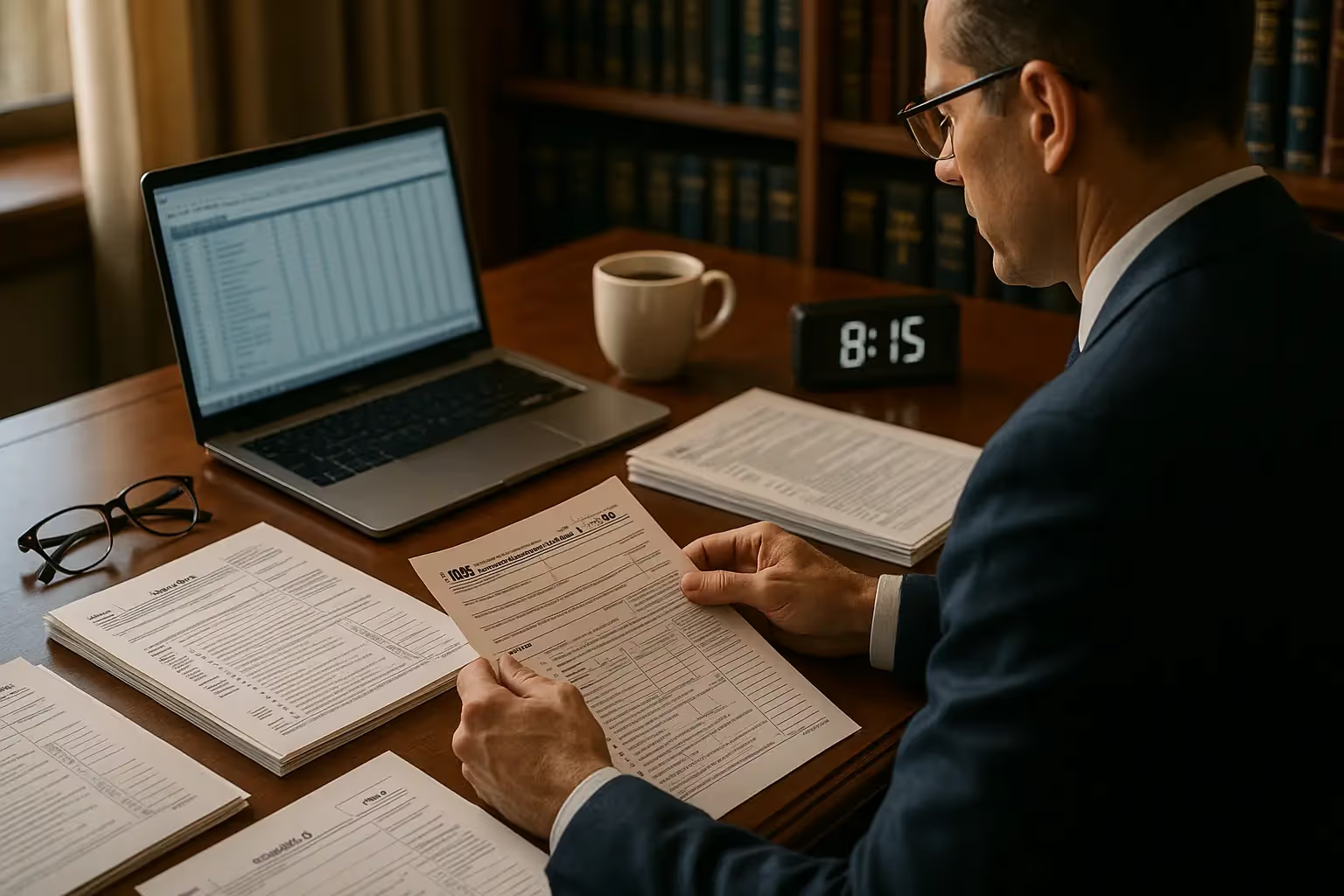
Filing an unfiled 2019 Form 940 matters because it ensures compliance with federal unemployment tax requirements. Businesses must accurately report payroll taxes to avoid future complications. The IRS uses this form to track contributions to unemployment programs. Filing late can disrupt compliance history and credibility with federal tax authorities.
The risks of leaving Form 940 unfiled include escalating penalties and daily compounding interest charges. The IRS imposes failure-to-file penalties that quickly accumulate. Enforcement actions may include tax liens, levies, or wage garnishments against the business. Ignoring payroll tax obligations only increases financial and legal exposure.
Fortunately, structured steps exist to resolve unfiled 2019 Form 940 issues effectively. Businesses can obtain prior-year forms directly from the IRS. Options such as installment agreements or penalty abatement provide pathways to manage outstanding balances. Taking action promptly restores compliance and helps protect the business from severe enforcement measures.
Understanding Form 940
Form 940 is critical in federal tax compliance, particularly for employers reporting federal unemployment tax obligations. It is an essential tax form that directly affects payroll taxes and compliance with Internal Revenue Service (IRS) requirements. Below is a detailed explanation of what this form does, how it works, and who must file it.
What Form 940 Is and Its Role in Reporting Federal Unemployment Tax
- Purpose of Form 940: Employers use Form 940 to report income subject to federal unemployment tax, known as FUTA.
- Connection to Payroll Taxes: This tax form works alongside payroll taxes already withheld for employees, but is funded entirely by employers.
- IRS Oversight: The Internal Revenue Service requires this annual tax return to maintain compliance with federal unemployment tax laws.
- Impact on Workers: The funds from this filing support unemployment tax systems that provide benefits to workers who have lost employment.
FUTA Tax Rates, Credits, and Wage Base
- Standard Rate: The FUTA federal unemployment tax rate is 6.0 percent of the first $7,000 of wages paid to each employee.
- Available Credits: Employers may claim up to 5.4 percent credits if they pay state unemployment taxes on time.
- Effective Rate Example: With credits, the effective FUTA rate drops to 0.6 percent for wages within the required wage base.
- IRS Review: The IRS applies these credits when the tax return is reviewed, provided deposits and filing meet due date requirements.
Who Must File Form 940
- General Criteria: You must file Form 940 if you paid wages of $1,500 or more in any calendar quarter.
- Employee Threshold: You must file if you employed one or more workers for at least 20 weeks during the prior year.
- Independent Contractors Exception: Independent contractors are not employees and do not trigger the Form 940 filing criteria.
- Multi-State Employers: For compliance, corporations or businesses operating across multiple states must file additional forms, like Schedule A.
Employers cannot ignore Form 940 because it ensures compliance with unemployment tax law, supports workers, and prevents penalties or interest on unpaid taxes. Filing this tax form on time, using IRS resources, and seeking guidance from a tax professional or CPA helps businesses maintain proper compliance and avoid costly enforcement actions.
Filing an Unfiled 2019 Form 940
Filing an unfiled 2019 Form 940 requires accuracy, correct forms, and compliance with Internal Revenue Service rules. Employers must follow the required process carefully to avoid penalties, interest, or errors that could trigger additional IRS notices. The following points outline the critical steps.
- Use the Correct Tax Form: Always prepare the 2019 version of Form 940, since prior years require specific instructions and forms.
- Rely on Official IRS Resources: Download the tax return and instructions directly from the IRS site to ensure compliance with unemployment tax law.
- Gather Payroll and Tax Records: Employers must collect payroll taxes, wage reports, deposits, available credits, and state unemployment tax records.
- Complete Return Information: Employers must report income, provide the business address, list employees, and indicate if independent contractors were employed.
- Calculate Tax Balance Accurately: Apply FUTA rates, credits, and deductions correctly to avoid unpaid taxes, excess payments, or partial-month errors.
- Review Special Filing Situations: Multi-state employers and credit reduction states must complete Schedule A and follow specific IRS guidance.
- Finalize and Submit Properly: Employers must sign, date, and mail the reviewed return with the correct payment or deposit to the IRS department.
Filing an unfiled 2019 Form 940 correctly ensures compliance, prevents unnecessary penalties, and protects businesses from costly enforcement actions. Timely filing with proper guidance from a tax professional or CPA strengthens credibility and maintains payroll tax compliance.
IRS Penalties and Interest
The IRS applies a failure to file penalty of 5% per month for an unfiled 2019 Form 940. This penalty continues until it reaches a maximum of 25% of the unpaid tax return balance. For example, if you owe $2,000, five months of delay adds $500. Missing the original due date increases penalties and interest dramatically over time.
Failing to pay a penalty applies even after you file your tax form with the Internal Revenue Service. This penalty ranges from 0.5% to 1% per partial month until the maximum of 25%. If an employer owes $4,000, being one year late can add $480 in penalties. These charges quickly accumulate and create significant payroll tax liabilities.
Employers also face 2% and 15% penalties for failing to deposit based on how late payroll taxes are deposited. The IRS also charges interest, compounding daily, at rates between 5% and 7% during 2019. For example, a $10,000 balance could generate hundreds of dollars in interest within a year. Penalties and interest make ignoring IRS notices far more expensive than timely filing.
IRS Enforcement and Personal Liability
The IRS uses strict enforcement measures when payroll taxes remain unpaid, including the Trust Fund Recovery Penalty. Employers and individuals controlling tax payments must understand how personal liability applies and how the IRS defines responsibility. The following points explain the TFRP and its impact.
- Trust Fund Recovery Penalty Explained: The TFRP allows the Internal Revenue Service to collect unpaid payroll taxes directly from responsible individuals.
- Connection to Payroll Taxes: These unpaid taxes include employee income tax withholdings and Social Security contributions that were never deposited with the IRS.
- Who Can Be Held Responsible: When payroll deposits are missed, owners, corporate officers, directors, accountants, and payroll providers can be held responsible.
- Definition of Willfulness: The IRS considers willfulness as knowingly using funds for other purposes instead of paying required payroll taxes.
- Assessment Process: The IRS issues a notice of proposed assessment, allowing the taxpayer to respond with evidence.
- Appeal Rights: Taxpayers can appeal by providing explanations, documentation, or demonstrating they lacked authority over payroll decisions.
The TFRP underscores that unpaid payroll taxes create risks beyond the business, exposing individuals to serious financial and legal consequences.
Resolution Options for 2019 Form 940 Issues
Several IRS resolution paths are available when a business faces unpaid payroll tax debts from an unfiled 2019 Form 940. Employers must evaluate eligibility, documentation, and the impact on compliance before selecting the correct option. Below are the most common solutions and their practical applications.
- Payment Plans Explained: The IRS offers short-term plans up to 120 days and long-term installment agreements extending to 72 months.
- Penalty Abatement Relief: Employers may request First Time Abate or reasonable cause penalty relief for prior years to reduce penalties.
- Offer in Compromise Option: If they meet strict IRS financial criteria, qualified taxpayers may settle for less than the total owed.
- Currently Not Collectible Status: The IRS may suspend collection efforts when taxpayers demonstrate that payment would create financial hardship.
- Choosing the Right Path: Employers should review funds, income, and business stability, and seek guidance from a tax professional or CPA.
Businesses can use the appropriate resolution option to address IRS payroll tax issues, restore compliance, and avoid escalating financial risks.
Action Steps for Compliance
Businesses with an unfiled 2019 Form 940 must act quickly to regain compliance with the Internal Revenue Service. Following a staged plan helps manage payroll tax liabilities, reduce penalties, and prevent additional IRS enforcement actions. Below are immediate, short-term, and long-term steps every employer should take.
Immediate Steps
- Download Required Forms: Obtain the 2019 Form 940 and instructions, as well as the prior years’ forms if additional filings are required.
- Gather Payroll Records: Collect payroll reports, employee wages, deposits, and credits to prepare a complete and correct tax return.
- Organize State Tax Information: Compile records of state unemployment tax payments to ensure accurate reporting and available credits.
- Review Filing Criteria: Verify which employees and wages are subject to FUTA tax and confirm compliance with IRS law.
Short-Term Steps
- File the Unfiled Return: Submit the completed 2019 Form 940 immediately to reduce penalties and stop further noncompliance issues.
- Request Penalty Relief: Apply for First Time Abate or reasonable cause relief if eligible to lower or remove assessed penalties.
- Set Up Installment Agreements: Contact the IRS to establish a payment plan for outstanding payroll taxes and unpaid balances.
- Respond to IRS Notices: Address any IRS correspondence promptly to avoid escalated enforcement actions such as liens or levies.
Long-Term Steps
- Create Compliance Systems: Implement payroll systems to ensure timely deposits, accurate reporting, and correct tax filings in the future.
- Monitor IRS Correspondence: Keep accounts and addresses updated to receive and respond to all IRS communications without delays.
- Seek Professional Help: Engage a CPA, tax professional, or payroll accountant for continued compliance and specialized guidance.
- Plan for Future Obligations: Establish quarterly payroll taxes and deductions reviews to prevent errors and lost compliance.
These steps provide a clear path to compliance while protecting the business from penalties, interest, and IRS enforcement. Acting quickly, preparing thoroughly, and seeking proper guidance ensures long-term financial stability and trust with the IRS.
When to Seek Professional Help
Some payroll tax situations are too complex or risky to resolve without professional assistance. Employers facing large liabilities, personal exposure, or multi-state complications should know when to involve a CPA, tax professional, or attorney. Below are the key scenarios where expert help becomes essential.
Large Tax Liabilities or Multiple Unfiled Returns
- High Dollar Amounts: Businesses owing large balances from payroll taxes or an unfiled 2019 Form 940 need a structured resolution.
- Multiple Tax Years: Unfiled payroll tax returns from prior years create compliance problems that significantly increase penalties and interest.
- Complex Penalties: A tax professional can evaluate maximum penalties, available credits, and payment options with correct explanations.
- IRS Negotiations: Accountants and CPAs can contact the IRS directly to negotiate installment agreements or penalty relief.
Cases Involving TFRP or Criminal Exposure
- Personal Liability Risks: The IRS may hold officers, owners, or payroll providers responsible under the Trust Fund Recovery Penalty.
- Criminal Exposure: Using funds for other purposes instead of payroll deposits may subject a business to IRS investigations.
- Legal Representation: A tax attorney can provide advice, prepare defenses, and ensure compliance with tax law requirements.
- Protecting Assets: Professional guidance helps reduce risks of liens, levies, or seizure of accounts due to unpaid taxes.
Complex Business Structures or Multi-State Filings
- Multi-State Employers: Businesses operating in multiple states must file Form 940 with Schedule A for unemployment tax compliance.
- Corporate Structures: Corporations with subsidiaries or partnerships need specialized guidance to avoid errors and filing delays.
- Payroll System Errors: Complex payroll systems often cause reporting issues that require review by a CPA or tax professional.
- Timely Compliance: Professionals ensure all forms, wages, and deposits are filed correctly and on the due date.
Warning Signs of Unscrupulous Tax Resolution Firms
- False Guarantees: Firms that guarantee debt elimination or fixed settlement amounts usually mislead taxpayers.
- High Upfront Fees: Demands for large payments before work begins signal an untrustworthy operation.
- Aggressive Sales Tactics: High-pressure methods to secure clients indicate a lack of genuine compliance resources.
- Lack of Transparency: Firms that do not provide complete explanations or avoid proper IRS criteria often create more problems.
Knowing when to seek professional help prevents errors, ensures compliance, and protects the employer and the business. By engaging qualified tax professionals, CPAs, or attorneys, taxpayers can resolve payroll tax issues effectively while avoiding further risks.
FAQs
What was the original due date for the 2019 Form 940?
The original due date for filing the 2019 Form 940 was January 31, 2020. Employers who deposited all federal unemployment tax on time received an extension until February 10, 2020. The IRS requires timely filing to avoid penalties, and the date applies regardless of whether a business owes payment or qualifies for credits. Missing the due date triggers immediate failure-to-file penalties and interest charges.
Can I still file my unfiled 2019 Form 940 now?
You can still file your unfiled 2019 Form 940, and the IRS strongly recommends doing so immediately. Filing late does not erase penalties or interest, but prevents them from increasing further. The IRS will accept prior-year tax returns using the correct 2019 forms. Submitting the return now reduces enforcement risks and shows good faith compliance, which may help in penalty abatement requests.
What happens if I never file Form 940 for prior years?
If you have never filed Form 940 in prior years, the IRS will eventually assess taxes based on available payroll records. Penalties for failure to file, failure to pay, and failure to deposit payroll taxes will continue accumulating. The IRS may issue liens or levies or pursue the Trust Fund Recovery Penalty against responsible individuals. Businesses risk wage garnishments, asset seizures, and even operating license loss for ignoring required payroll tax filings.
How much will IRS penalties and interest add up to after several years?
IRS penalties and interest can easily double or even triple the original payroll tax debt over several years. The failure-to-file penalty is 5% per month, up to 25%, while failure-to-pay adds 0.5%–1% monthly. Interest compounds daily on unpaid taxes and penalties, usually between 5% and 7% annually. For example, a $10,000 balance left unresolved for five years could result in over $20,000 owed once penalties and interest are added.
Can penalties exceed my original payroll tax debt?
Yes, IRS penalties can exceed your original payroll tax debt if you fail to file or pay for several years. Failure-to-file and failure-to-pay penalties can reach 50% or more of the unpaid taxes. Daily compounding interest further increases the balance, pushing the total beyond the original liability. For example, $5,000 in unpaid payroll taxes could grow to more than $10,000 with penalties and interest. Timely filing and payment reduce this financial burden.
How do I request First Time Abate penalty relief?
To request First Time Abate penalty relief, call the IRS using the contact number on your penalty notice. Explain that you meet the criteria, including filing all required tax returns for the past three years and having a clean compliance history. The IRS will review your account and determine if you qualify. In many cases, penalties for failure to file, pay, or deposit are removed under this relief program.
What happens if I miss payments on an installment agreement?
If you miss payments on an IRS installment agreement, the IRS may place your account in default. Default allows the IRS to resume enforcement actions such as levies, liens, or wage garnishments. You can usually request reinstatement of the agreement by contacting the IRS quickly and explaining. Continued missed payments increase penalties, interest, and the likelihood of harsher collection actions. Staying current with all payments and filings prevents default and enforcement.



.avif)


.avif)













































































